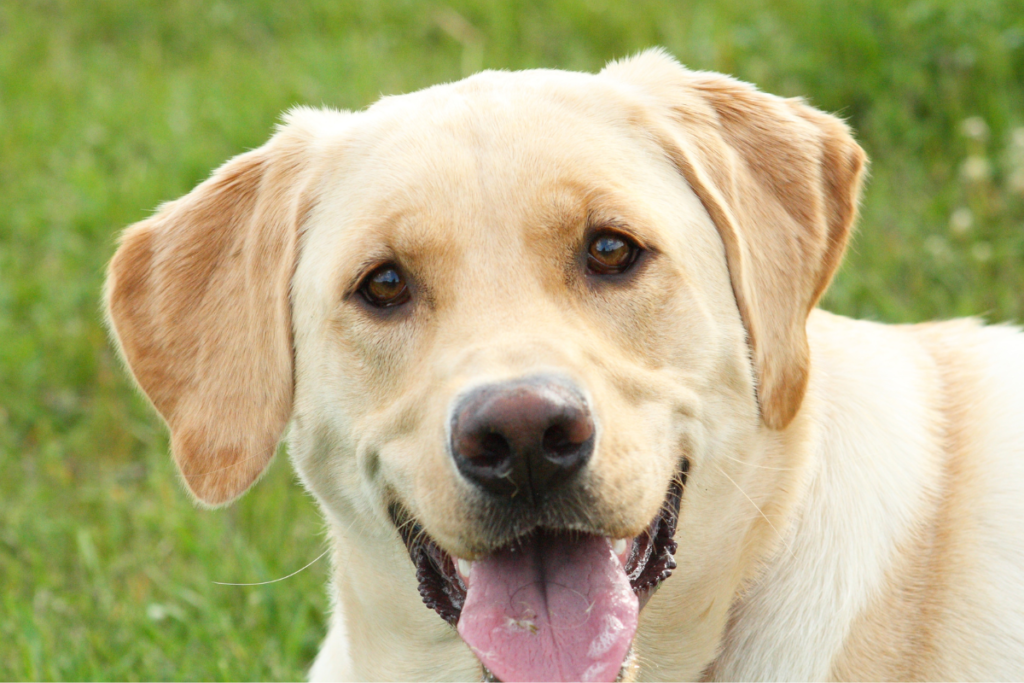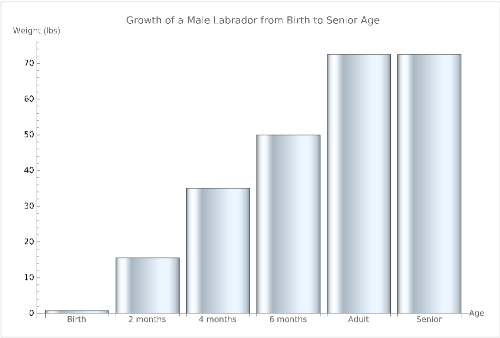
Just like us, every Labrador has its unique quirks, playful antics, and yes, even its ideal weight.
Understanding your Lab’s health is more than just regular vet visits and those delightful treats (which they can never get enough of, right?). It’s about knowing the ins and outs of what makes them tick. And a significant part of that is their weight.
Now, you might wonder, “Why is weight so important?” Well, it’s a window into their overall well-being. Just like we feel our best when we’re fit and active, our Labs do too. Whether they’re chasing after a ball, taking those refreshing swims, or just lounging by your side, their weight plays a pivotal role in how they feel and act.
Is Your Labrador at Its Ideal Weight? Find Out Now
Labrador Weight calculator
In this calculator you can input your Labrador's age, gender, and current weight to determine if your dog is within the ideal weight range. Whether your dog is underweight, overweight, or at its ideal weight, this tool will help in achieving and maintaining a healthy weight.
.
Labrador Growth Journey: From Puppies to Seniors - A Tale of Two Genders
These charts provide a visual representation of the typical weight progression for both male and female Labradors, from birth to their senior years. By comparing the two, you can gain insights into the subtle weight differences between the genders as they grow and mature.

Growrth Chart
Male – Female

The Weighty Tale of Your Labrador: A Journey Through Scales and Tails

The Consequences of Being Underweight
What if your furry friend is underweight? Well, the once vibrant and energetic Labrador you knew might now present a different picture. This isn’t just about being a few pounds light; it’s a serious concern with real implications:
- Battling Invisible Enemies: An underweight Labrador is akin to a knight without armor, more prone to illnesses and infections.
- Diminished Vitality: The usual exuberance and zest for life? It might be replaced by a noticeable lack of energy, affecting their playfulness and spirit.
- Growth and Development at Stake: For Labrador puppies, being underweight isn’t just about size; it’s about missing out on essential development milestones.
The Burden of Excess: Understanding the Risks of an Overweight Labrador
Conversely, an overweight Labrador faces a different set of challenges, each extra pound adding to their struggle:
- Joint Pain and Mobility Issues: Imagine the discomfort as each step becomes a painful effort, leading to joint problems and potentially arthritis.
- Heart Health Concerns: An overweight Labrador’s heart works overtime, increasing the risk of heart diseases and complications.
- The Clock Ticks Faster: It’s a harsh reality that being overweight can shorten the precious time you have with your furry companion.
In Pursuit of Perfection: The Ideal Weight for Your Labrador
Finding the perfect balance in your Labrador’s weight is like striking gold. It’s not just about looks; it’s about their health, happiness, and longevity:
- A Symphony of Strength and Agility: The right balance of muscle and fat transforms your Lab into an agile, strong companion, ready for every adventure.
- Unleashing Boundless Energy: Watch as they reclaim their vigor, turning every game of fetch into a display of joyous energy.
- Crafting a Longer, Joyful Story Together: Achieving this ideal weight is your gift to them – more chapters in your shared story, filled with love, health, and endless tail wags.
Weight Calculator
Weight by Color

Labrador Weight Distribution by Color: Black, Chocolate, and Yellow
The average weights of Labradors based on their color.
| Labrador Color | Average Weight (Male) | Average Weight (Female) | Average Weight (Puppy) |
|---|---|---|---|
| Black Labrador | 72.5 lbs | 67.5 lbs | 25 lbs (at 6 months) |
| Chocolate Labrador | 72.5 lbs | 67.5 lbs | 24 lbs (at 6 months) |
| Yellow Labrador | 72.5 lbs | 67.5 lbs | 26 lbs (at 6 months) |
Busting Labrador Weight Myths: The Truth Behind the Tales
You’ve probably heard a few “facts” about what’s normal or ideal for a Labrador’s weight, but let’s separate the wheat from the chaff and get down to the real deal.
Myth 1: “A Chubby Lab is a Happy Lab”
- The Reality: While we all love to see a content and well-fed Labrador, carrying extra pounds isn’t a sign of happiness. In fact, it’s quite the opposite. Overweight Labs are at risk of health issues like joint problems, diabetes, and heart disease. For a healthy Labrador, you should notice a distinct waistline and be able to feel their ribs with ease, though they shouldn’t be visibly prominent.. So, let’s aim for fit, not fat!
Myth 2: “Labradors Will Stop Eating When They’re Full”
- The Truth: Labradors are known for their love of food, and many would happily eat all day if given the chance! They’re not the best at self-regulating their food intake, so it’s up to us as responsible pet parents to monitor their diet and ensure they’re not overeating.
Myth 3: “All Labradors Should Weigh the Same”
- The Insight: Just like humans, every Labrador is unique. Their ideal weight depends on various factors like age, gender, build, and activity level. A one-size-fits-all approach doesn’t work here. It’s important to consult with your vet to determine what’s healthy for your individual Lab.
Myth 4: “A Labrador’s Weight Isn’t a Big Deal”
- The Clarification: Oh, but it is! Maintaining a healthy weight is crucial for a Labrador’s overall well-being and longevity. Ignoring their weight can lead to a host of health problems and even shorten their lifespan. Regular check-ups and a balanced diet are key.
Myth 5: “Diet Food is the Only Way to Manage a Lab’s Weight”
- The Balanced View: While diet food can be a part of weight management, it’s not the only solution. Regular exercise, portion control, and a balanced diet are equally important. It’s about creating a healthy lifestyle, not just a temporary diet fix.
So, there you have it, folks – the truth about Labradors and their weight. Remember, keeping your Lab at a healthy weight is one of the best ways to ensure they live a long, happy, and active life by your side. Let’s cherish and care for our furry friends the right way!
What is The Key to a Healthy, Happy Labrador?
Keeping an eye on your Lab’s weight isn’t just a part of pet care; it’s a cornerstone of their overall health and happiness.
The Importance of Monitoring Weight
- A Healthy Balance: Remember, weight management is a balancing act. It’s not just about preventing obesity; it’s also about ensuring your Lab isn’t underweight. Both extremes have their risks, and finding that sweet spot is crucial.
- A Sign of Overall Health: Your Lab’s weight is like a health barometer. It can indicate underlying issues or the need for dietary adjustments. Regular monitoring helps you stay on top of their health needs.
The Role of Regular Vet Check-Ups
- Expert Insights: Vets are like detectives for your Lab’s health. They can spot issues you might miss and provide tailored advice for your dog’s specific needs.
- Preventive Care: Regular check-ups can catch potential health problems early, making them easier to manage or even prevent. Think of these visits as investments in your Lab’s future well-being.
The Magic of a Balanced Diet
- Quality Over Quantity: It’s not just about how much your Lab eats, but what they eat. A diet rich in nutrients, appropriate for their age and activity level, is key.
- Tailored to Your Lab: Each Labrador is unique, and their diet should reflect that. What works for one may not work for another. Your vet can help you craft a diet plan that’s just right for your furry friend.
Remember that your Labrador’s weight journey is a shared adventure. It’s about more than numbers on a scale; it’s about a lifestyle that promotes health, vitality, and joy. By keeping a watchful eye on their weight, ensuring regular vet visits, and providing a balanced diet, you’re setting the stage for a long, happy life together. Here’s to many more years of wagging tails, playful barks, and loving companionship with your four-legged best friend!



